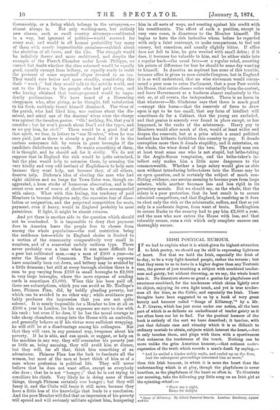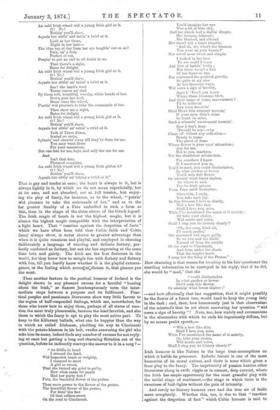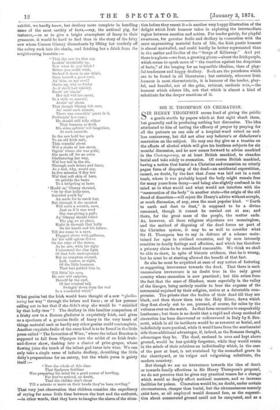IRISH POETICAL HUMOUR.
IF we had to explain what it is which gives its highest attraction to Irish poetry, we should say its skill in expressing lightness of heart. Not that we hold the Irish, especially the Irish of to-day, to be a very light-hearted people, rather the reverse; but that they seem to us to have in a higher degree than any Teutonic race, the power of just touching a subject with combined tender- ness and gaiety, but without throwing, as we say, the whole heart into it. No literature shows so great a genius for playfulness and sweetness combined, for the tenderness which skims lightly over its object, enjoying its own light touch, and yet is true tender- ness all the time, as the Celtic, and especially the Irish. These thoughts have been suggested to us by a book of very great beauty and humour called "Songs of Killarney,"* by a Mr. A. P. Graves, which has just come under oar notice, all the best part of which is as delicate an embodiment of tender gaiety as it has often been our lot to find. For the poetical humour of the book is entirely of the sort we have described; it touches, with just that delicate ease and vivacity which it is so difficult to ordinary mortals to attain, subjects which interest the heart,—but it only touches them, and plays with them with a sportiveness that enhances the tenderness of the touch. Nothing can be more unlike the grim American humour,—that reticent under- expression of the truth which records a man's death by saying,— "And he smiled a kinder sickly smile, and curled up on the floor,
And the subsequent proceedings interested him no more," than this Irish humour, in which it is more the heart than the understanding which is at play, though the playfulness is never heartless, as the playfulness of the heart so often is. To illustrate our meaning, take the following gay little song on an Irish girl at the spinning-wheel :—
" Show me a sight,
Bates for delight
* Bongs of Killarney. By Alfred Pereeval Graves. London: Bradbury, Agnew and 00.
An ould Irish wheel wid a young Irish girl at it.
0! No!
Nothin' you'll show, Aquals her sittin' and takin' a twirl at it.
Look at her there,
Night in her hair—
The blue ray of day from her eye lan.ghin' out on us !
Fair, an' a foot, Perfect of cut, Peepin' to put an end to all doubt in us.
That there's a sight, Bates for delight An ould Irish wheel wid a young Irish girl at it.
0 ! No !
Nothin' you'll show, Aquals her sittin' an' takin' a twirl at it.
See the lamb's wool Tarns coarse an' dull By them soft, beautiful, weeshy, white hands of her.
Down goes her heel, Roun' runs the wheel, Purrin' wid pleasure to take the commands of her.
Then show me a sight, Bates for delight An ould Irish wheel wid a young Irish girl at it.
0! No Nothin' you'll show, Aquals her sittin' an' takin' a twirl at it.
Talk of Three Fates, Seated on seats, Spinnin' and shearin' away till they've done for me.
You may want three For your massacree, But one fate for me, boys, and only the one for me.
And Isn't that fate, Pictured complate, An mid Irish wheel wid a young Irish girl at it?
0! No Nothin' you'll show, Aquals her sittin' an' taking a twirl at it."
That is gay and tender at once; the heart is always in it, but is always lightly in it, by which we do not mean superficially, but at its ease, and not absorbed, not at full tension, but enjoy- ing the play of fancy, for instance, as to the wheel, " purrin'
wid pleasure to take the commands of her," and as to the far greater finality of a Fate embodied in such a form as this, than in the shape of the three sisters of the Greek legend. The Irish magic of touch is not the highest magic, but it is almost the highest magic compatible with the interpretation of a light heart. That "reaction against the despotism of facts" which we have often been told that Celtic faith and Celtic fancy always show, is never shown to greater advantage than when it is quite conscious and playful, and employed in choosing deliberately a language of cunning and delicate flattery, per- fectly confessed as flattery, but not the less expressing at the same time love and gaiety. The Irish are the best flatterers in the world, for they know how to mingle fun with flattery and flattery with fun, till you hardly know whether it is the playful extrava- gance, or the feeling which aeemsj,to."dictate it that pleases you the most.
Then another feature in the poetical humour of Ireland is the delight shown in any pleasant excuse for a fanciful "beating about the bush," as Saxons ,:contemptuonsly term the inter- mediate steps between a purpose and its fulfilment. Prac- tical peoples and passionate literatures show very little favour to the region of half-suspended feelings, which are, nevertheless, for those who know how to enjoy them, perhaps of all states of emo- tion the most truly pleasurable, because the least feverish, and also those in which the fancy is apt to play the most active part. To keep to the Killarney ballads, what can be happier than the way in which an exiled Irishman, plodding his way to Cincinnati with the potato-blossom in his belt, evades answering the girl who asks him its name, indeed finds any number of excuses for not reply- ing at once but getting a long and charming flirtation out of the question, before he indirectly conveys the answer to it in a song 7—
" As fiddle in hand
I crossed the land, Wid homesick heart so weighty, I chanced to meet A girl so sweet, That she turned my grief to garty. Now what cause for pause Had her party feet ? Fair, the beautiful flower of the prate°.
Then more power to the flower of the prate°. The beautiful flower of the pratee, For fain' the feet Of that colleen sweet On the road to Cincinnati. You'd imagine her eye Was a bit of blue sky, And her cheek had a darlin' dimple.
Her footstep faltered ; She blushed, and altered Her shawl wid a timid trimble.
And oh, sir, what's the blossom You wear on your bosom?'
She asked most sweet and simple.
I looked in her face To see could I trace Any hint of lurkin' levity ; But there wasn't a line Of her features fine But expressed the gentlest gravity.
So quite at my aise At her innocent ways, Wid sorra a sign of brevity, Says I. 'Don't you know Where these blossoms blow, And their name of fame, =yeoman ?
I'd be beliovin' You were deceivin' Shiel Dhuv this summer mornin,' If your eyes didn't shine So frank on mine, Such a schemin' amusement scornin'.
Now I don't deny 'Twould be asy—why
Clone off widout any reflection—
Barely to name The plant of fame Whose flower is your oyes' attraction ; Asp for me, But to you, machree, Not the slenderest satisfaction.
For somehow I know If I answered you so, You'd be mad, you could dierimimber, In what garden or bower You'd seen this flower Or adornin' what forest timber, Or whore to seek For its fruit unique From June until November.
Since thin, I reply, You take such joy.
In this blossom I love so dearly, Wid a bow like this Shall I lave you, miss, Whin I've mentioned the name of it merely ; Or take your choice, Wid music and voice, Shall I sing you its history clearly ?'
'Oh, the song, kind sir, I'd much prefer,' She answered wid eager gai'ty.
So wo two nod the fiddle Turned off from the middle Of the road to Cincinnati, And from under the shade That the maples made I sang her the Song of the Pratee."
How charming is that reason for breaking to his fair questioner the startling information to be conveyed in his reply, that if be did, she would be "mad," that she
"could disrimimber In what garden or bower She'd seen this flower, Or adernire what forest timber ;"
—and how effectually that last suggestion, that it might possibly be the flower of a forest tree, would tend to keep the young lady in the dark ; and, then, how humorously just is that observatiou of the minstrel's that he set about answering her question " vrid sorra a sign of brevity " I Note, too, how stately and ceremonious is the alternative with which he ends his ingeniously diffuse, but by no means prolix speech,—
" Wid a bow like this,
Shall I lave you, miss,
Whin I've mentioned the name of it merely,
Or, take your choice, Wid music and voice, Shall I sing you its history clearly ?"
Irish humour is like Nature in the large time-assumptions on which it builds its processes. Infinite leisure is one of the most humorous of its moral axioms, and there is none which gives a freer play to the fancy. The impetuosity of passion hurries other literatures along in swift ripple or in earnest, deep current, where the Irish has ample opportunity for the most graceful play with the initial stage of sentiment,—the stage in which there is the sweetness of half-lights without the pain of intensity.
And surely no literary humour ever had the true air of frolic more completely. Whether this, too, is due to that "reaction against the despotism of fact" which Celtic humour is said to exhibit, we hardly know, but drollery more complete in handling some of the most earthly of facts,—say, the national pig, for instance,—so as to give a bright atmosphere of fancy to their grossness, it would be hard to find than in the story of the fairy sow whom Connor Glanny disenchants by lifting her tenderly off the sultry rock into the shade, and fetching her a drink from the neighbouring fountain :—
" Thin the sow for that sup
Look in' thankfully up,
Now what do you think ?
Before you could wink, Sucked it down in one drink, Gave herself a good rowl, An' thin, on my sowl!
Starts up, why as frisky As if she'd had whisky, Ruin' an' chasin' Her tail wid her snout, In a style so amazin', Aroun' an' about, That though Glanny felt sure, An' surer each minute, There was somethin' quaro in it, Performin' her cure ; He should still folly at titer That bonneen so droll, His sides splittin' wid laughther, At each caracole.
So the sow held her path To an old Irish rath, Thin roundin' about Wid a shake of her snout, Signin' where she was gem', She made off for an owen Gladiatoring her way, Wid her tail in the air, Through such briars and furze, As a fool, why, would say, In five minutes 'd flay her Wid that soft akin of hers, Or prickle the baste To a hedgehog at lege.
Hould on,' Glanny shouted, 'Or by that holly-tree, Suicided you'll be,' An made for to catch her, But through it she snouted Wid sorra a scratch, sure, Just as if it was wool She was giving a pull; An' Glanny should follow The pig, av ye plazo, Right in through that holly On his hands and his knees; Till she came to a cave, Flagged above with gallauns, An' the ould ogham Greve On the edge of the stones, As he saw, whin his sight Understood the dim light Of that hole underground.
But no symptom around, Loft, centre, or right, Of the little bonneen That had guided him in.
Till liftin' his eyes, He sees wid surprise, Herself by the curl, Of her comical tail, Swingin' down from the roof In a wonderful whirL"
What genius but the Irish would have thought of a sow "gladia- toring her way" through the briars and furze ; or of her pursuer calling out to her that if she didn't atop she would be " suicided by that holly-tree " ? 'rho drollery in this familiar comparison of a frisky sow to a Roman gladiator is exquisitely Irish, and gives us a specimen of a genuine frolic of fancy in the very heart of things material such as hardly any other genius could contemplate. Another exquisite frolic of the same kind is to be found in the little poem called "The Invention of Wine," where the infant Bacchus is supposed to fall from Olympus into the midst of an Irish fruit- and-flower show, dashing into a cluster of prize-grapes, whose flowing juice the touch of the infant god turns into wine. We can only take a single verse of infinite drollery, describing the little deity's preparations for an outcry, but the whole poem is gaiety
itself
" Now the whole of this time That Spalpeen Sublime Was preparing his mind for a good coorse of howling, For you've noticed, no doubt, That the childer don't shout Till a minute or more on their heads they've been rowling."
That very just observation that children consider, the expediency of crying for some little time between the hurt and the outburst, —in other words, that they have to imagine the alarm of the situa- tion before they resent it—is another very happy illustration of the delight which Irish humour takes in exploring the intermediate region between emotion and action. For tender gaiety, for playful sweetness, for genuine frolic and drollery in connection with the most unpromising material facts of life, the Irish poetic humour is almost unrivalled, and could hardly be better represented than in the earlier and livelier of the "Songs of Killarney." And yet there is a gloom—we fear, a growing gloom—about the Irish people, which seems to speak more of" the reaction against the despotism of facts," of the longing for an impossible idealism, than of play- ful tenderness and happy drollery. Such are the paradoxes which are to be found in all literatures ; but certainly, wherever Irish humour is most characteristic, it is humour of the tender, play- ful, and fanciful, not of the grim, reticent, sardonic vein,—the humour which adorns life, not that which is almost a kind of substitute for the deeper emotions of it.












































 Previous page
Previous page